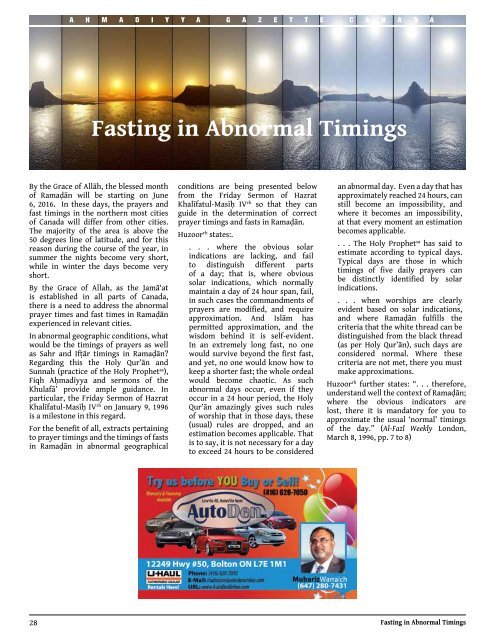You also want an ePaper? Increase the reach of your titles
YUMPU automatically turns print PDFs into web optimized ePapers that Google loves.
Fasting in Abnormal Timings<br />
By the Grace of Allāh, the blessed month<br />
of Ramaḍān will be starting on June<br />
6, 2016. In these days, the prayers and<br />
fast timings in the northern most cities<br />
of Canada will differ from other cities.<br />
The majority of the area is above the<br />
50 degrees line of latitude, and for this<br />
reason during the course of the year, in<br />
summer the nights become very short,<br />
while in winter the days become very<br />
short.<br />
By the Grace of Allah, as the Jamā‘at<br />
is established in all parts of Canada,<br />
there is a need to address the abnormal<br />
prayer times and fast times in Ramaḍān<br />
experienced in relevant cities.<br />
In abnormal geographic conditions, what<br />
would be the timings of prayers as well<br />
as Sahr and Ifṭār timings in Ramaḍān?<br />
Regarding this the Holy Qur’ān and<br />
Sunnah (practice of the Holy Prophet sa ),<br />
Fiqh Aḥmadīyya and sermons of the<br />
Khulafā’ provide ample guidance. In<br />
particular, the Friday Sermon of Hazrat<br />
Khalīfatul-Masīḥ IV rh on January 9, 1996<br />
is a milestone in this regard.<br />
For the benefit of all, extracts pertaining<br />
to prayer timings and the timings of fasts<br />
in Ramaḍān in abnormal geographical<br />
conditions are being presented below<br />
from the Friday Sermon of Hazrat<br />
Khalīfatul-Masīḥ IV rh so that they can<br />
guide in the determination of correct<br />
prayer timings and fasts in Ramaḍān.<br />
Huzoor rh states:.<br />
. . . where the obvious solar<br />
indications are lacking, and fail<br />
to distinguish different parts<br />
of a day; that is, where obvious<br />
solar indications, which normally<br />
maintain a day of 24 hour span, fail,<br />
in such cases the commandments of<br />
prayers are modified, and require<br />
approximation. And Islām has<br />
permitted approximation, and the<br />
wisdom behind it is self-evident.<br />
In an extremely long fast, no one<br />
would survive beyond the first fast,<br />
and yet, no one would know how to<br />
keep a shorter fast; the whole ordeal<br />
would become chaotic. As such<br />
abnormal days occur, even if they<br />
occur in a 24 hour period, the Holy<br />
Qur’ān amazingly gives such rules<br />
of worship that in those days, these<br />
(usual) rules are dropped, and an<br />
estimation becomes applicable. That<br />
is to say, it is not necessary for a day<br />
to exceed 24 hours to be considered<br />
an abnormal day. Even a day that has<br />
approximately reached 24 hours, can<br />
still become an impossibility, and<br />
where it becomes an impossibility,<br />
at that every moment an estimation<br />
becomes applicable.<br />
. . . The Holy Prophet sa has said to<br />
estimate according to typical days.<br />
Typical days are those in which<br />
timings of five daily prayers can<br />
be distinctly identified by solar<br />
indications.<br />
. . . when worships are clearly<br />
evident based on solar indications,<br />
and where Ramaḍān fulfills the<br />
criteria that the white thread can be<br />
distinguished from the black thread<br />
(as per Holy Qur’ān), such days are<br />
considered normal. Where these<br />
criteria are not met, there you must<br />
make approximations.<br />
Huzoor rh further states: “. . . therefore,<br />
understand well the context of Ramaḍān;<br />
where the obvious indicators are<br />
lost, there it is mandatory for you to<br />
approximate the usual ‘normal’ timings<br />
of the day.” (Al-Fazl Weekly London,<br />
March 8, 1996, pp. 7 to 8)<br />
28 Fasting in Abnormal Timings


